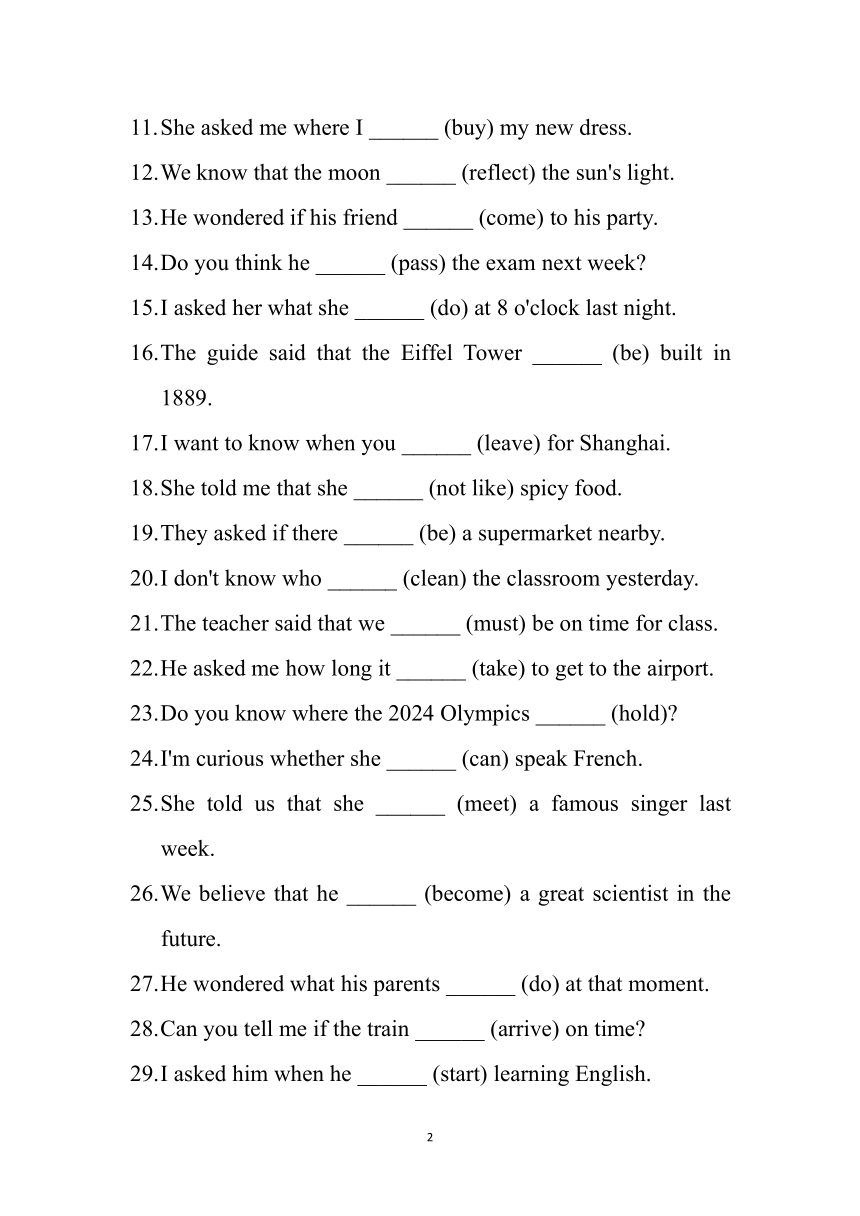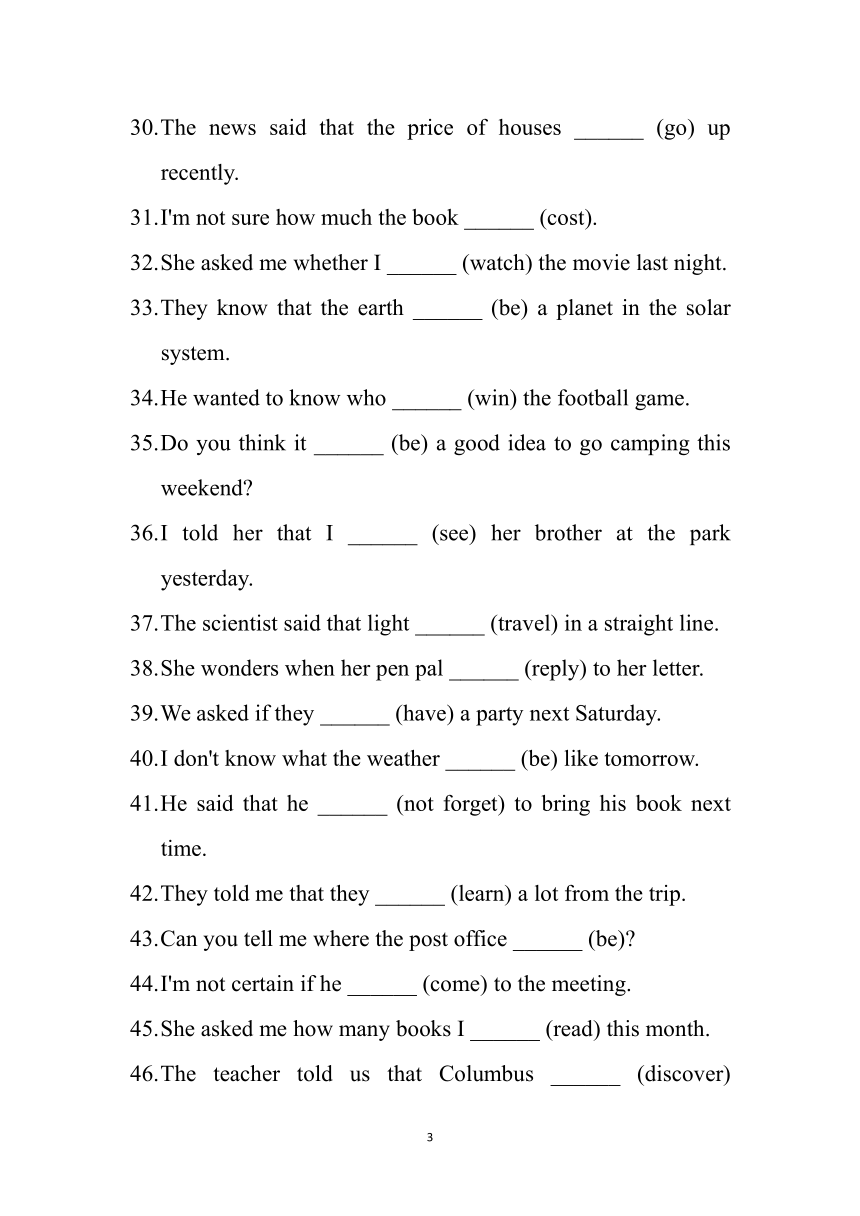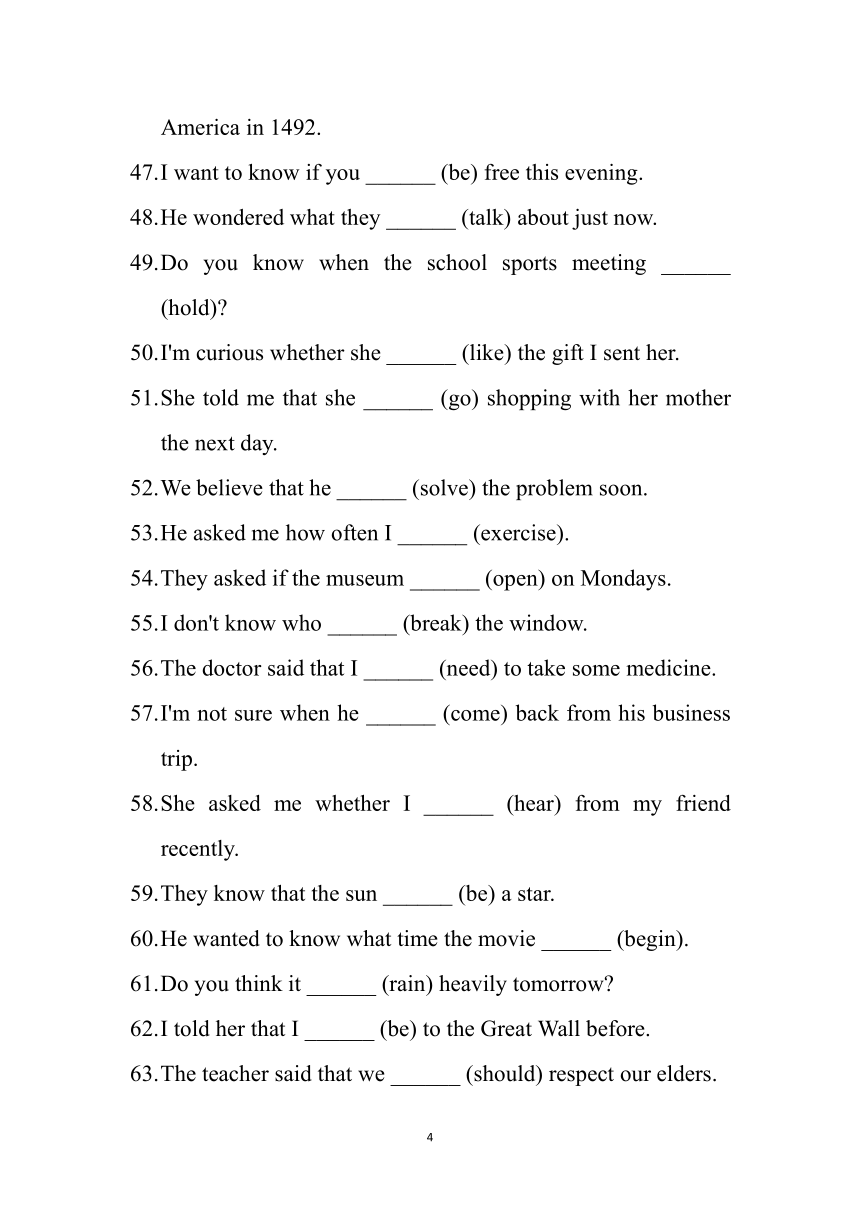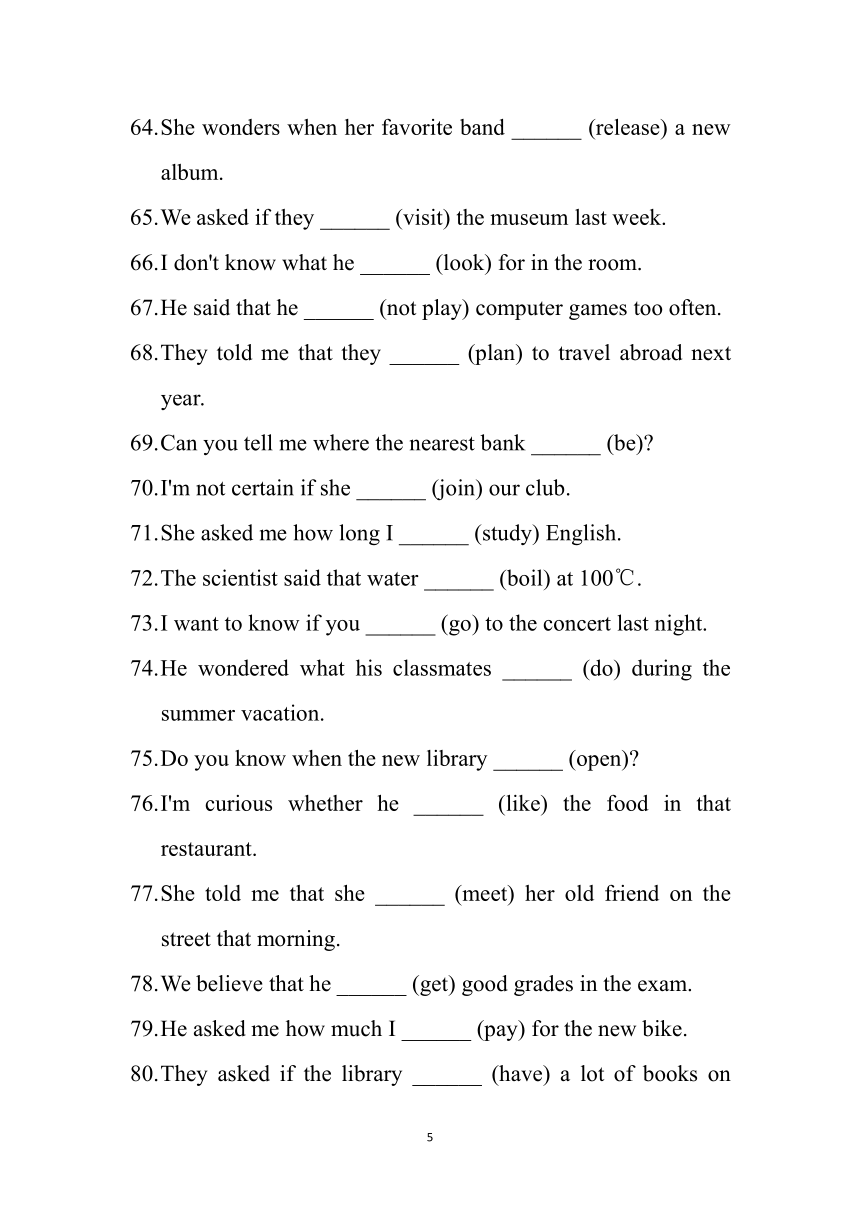【原创】专题01 宾语从句100题-2025中考英语二轮专题复习(答题技巧+题目分类与分层)
文档属性
| 名称 | 【原创】专题01 宾语从句100题-2025中考英语二轮专题复习(答题技巧+题目分类与分层) |  | |
| 格式 | docx | ||
| 文件大小 | 27.7KB | ||
| 资源类型 | 试卷 | ||
| 版本资源 | 人教新目标(Go for it)版 | ||
| 科目 | 英语 | ||
| 更新时间 | 2025-02-25 10:56:11 | ||
图片预览





文档简介
专题01 宾语从句100题
答题技巧
确定主从句时态关系:当主句是一般现在时,从句时态不受限制,根据实际情况使用相应时态,如描述客观真理或事实用一般现在时;表示将来的动作用一般将来时等。若主句是一般过去时,从句通常要用过去的某种时态(一般过去时、过去进行时、过去将来时、过去完成时 ),但从句是客观真理或事实时,仍用一般现在时。
关注时间状语:时间状语是判断从句时态的重要依据。像 “yesterday、last week、in 1980” 等表示过去时间的状语,从句常用一般过去时;“tomorrow、next week、in the future” 等表示将来时间的状语,从句常用一般将来时;“now、at present” 等表示现在时间的状语,从句常用现在进行时或一般现在时;“recently、already、yet、for + 时间段、since...” 等常与现在完成时连用。
考虑直接引语变间接引语规则:直接引语变间接引语时,除了时态变化,指示代词(this/that 等 )、时间状语(today/yesterday 等 )、地点状语(here/there 等 )和人称代词等都可能需要相应变化。例如,直接引语中的 “this” 在间接引语中可能变为 “that”;“yesterday” 可能变为 “the day before” 。
分析句子逻辑和语境:结合句子所表达的逻辑和具体语境来确定从句时态。比如,描述过去某个时间点正在进行的动作,即使没有明确的时间状语,根据上下文逻辑判断是过去进行时的语境,就用过去进行时。再如,动作发生在过去的过去,且对过去的某个动作或状态产生影响,用过去完成时。
The teacher asked us if we ______ (finish) our homework yet.
I wonder when the meeting ______ (start) tomorrow.
She said that she ______ (be) to Paris twice.
Do you know who ______ (invent) the telephone
He asked me whether I ______ (like) classical music.
I don't know what time the library ______ (close) on weekends.
The doctor said that I ______ (should) drink more water.
They told me that they ______ (go) on a trip last month.
Can you tell me how I ______ (get) to the nearest hospital
I'm not sure if it ______ (rain) this afternoon.
She asked me where I ______ (buy) my new dress.
We know that the moon ______ (reflect) the sun's light.
He wondered if his friend ______ (come) to his party.
Do you think he ______ (pass) the exam next week
I asked her what she ______ (do) at 8 o'clock last night.
The guide said that the Eiffel Tower ______ (be) built in 1889.
I want to know when you ______ (leave) for Shanghai.
She told me that she ______ (not like) spicy food.
They asked if there ______ (be) a supermarket nearby.
I don't know who ______ (clean) the classroom yesterday.
The teacher said that we ______ (must) be on time for class.
He asked me how long it ______ (take) to get to the airport.
Do you know where the 2024 Olympics ______ (hold)
I'm curious whether she ______ (can) speak French.
She told us that she ______ (meet) a famous singer last week.
We believe that he ______ (become) a great scientist in the future.
He wondered what his parents ______ (do) at that moment.
Can you tell me if the train ______ (arrive) on time
I asked him when he ______ (start) learning English.
The news said that the price of houses ______ (go) up recently.
I'm not sure how much the book ______ (cost).
She asked me whether I ______ (watch) the movie last night.
They know that the earth ______ (be) a planet in the solar system.
He wanted to know who ______ (win) the football game.
Do you think it ______ (be) a good idea to go camping this weekend
I told her that I ______ (see) her brother at the park yesterday.
The scientist said that light ______ (travel) in a straight line.
She wonders when her pen pal ______ (reply) to her letter.
We asked if they ______ (have) a party next Saturday.
I don't know what the weather ______ (be) like tomorrow.
He said that he ______ (not forget) to bring his book next time.
They told me that they ______ (learn) a lot from the trip.
Can you tell me where the post office ______ (be)
I'm not certain if he ______ (come) to the meeting.
She asked me how many books I ______ (read) this month.
The teacher told us that Columbus ______ (discover) America in 1492.
I want to know if you ______ (be) free this evening.
He wondered what they ______ (talk) about just now.
Do you know when the school sports meeting ______ (hold)
I'm curious whether she ______ (like) the gift I sent her.
She told me that she ______ (go) shopping with her mother the next day.
We believe that he ______ (solve) the problem soon.
He asked me how often I ______ (exercise).
They asked if the museum ______ (open) on Mondays.
I don't know who ______ (break) the window.
The doctor said that I ______ (need) to take some medicine.
I'm not sure when he ______ (come) back from his business trip.
She asked me whether I ______ (hear) from my friend recently.
They know that the sun ______ (be) a star.
He wanted to know what time the movie ______ (begin).
Do you think it ______ (rain) heavily tomorrow
I told her that I ______ (be) to the Great Wall before.
The teacher said that we ______ (should) respect our elders.
She wonders when her favorite band ______ (release) a new album.
We asked if they ______ (visit) the museum last week.
I don't know what he ______ (look) for in the room.
He said that he ______ (not play) computer games too often.
They told me that they ______ (plan) to travel abroad next year.
Can you tell me where the nearest bank ______ (be)
I'm not certain if she ______ (join) our club.
She asked me how long I ______ (study) English.
The scientist said that water ______ (boil) at 100℃.
I want to know if you ______ (go) to the concert last night.
He wondered what his classmates ______ (do) during the summer vacation.
Do you know when the new library ______ (open)
I'm curious whether he ______ (like) the food in that restaurant.
She told me that she ______ (meet) her old friend on the street that morning.
We believe that he ______ (get) good grades in the exam.
He asked me how much I ______ (pay) for the new bike.
They asked if the library ______ (have) a lot of books on history.
I don't know who ______ (give) her the flowers.
The doctor said that I ______ (shouldn't) eat too much junk food.
I'm not sure when the plane ______ (take) off.
She asked me whether I ______ (be) interested in art.
They know that the moon ______ (have) no atmosphere.
He wanted to know what time the store ______ (open) in the morning.
Do you think he ______ (finish) his project on time
I told her that I ______ (lose) my keys yesterday.
The teacher said that we ______ (mustn't) cheat in the exam.
She wonders when her favorite TV show ______ (start) again.
We asked if they ______ (go) hiking last weekend.
I don't know what he ______ (want) to be when he grows up.
He said that he ______ (not go) to the party because he was busy.
They told me that they ______ (see) a wonderful movie last night.
Can you tell me where the library ______ (keep) the magazines
I'm not certain if she ______ (come) to our party tomorrow.
She asked me how many countries I ______ (travel) to.
The scientist said that plants ______ (need) sunlight to grow.
I want to know if you ______ (finish) your work yet.
He wondered what his parents ______ (prepare) for dinner.
答案解析
had finished。主句 “asked” 是一般过去时,从句动作 “finish homework” 发生在 “asked” 之前,即 “过去的过去”,用过去完成时。
will start。“tomorrow” 表明从句动作发生在将来,用一般将来时。
had been。“said” 是一般过去时,“be to Paris” 发生在 “said” 之前,用过去完成时。
invented。“发明电话” 是过去发生的动作,用一般过去时。
liked。主句 “asked” 是一般过去时,从句时态与之呼应,用一般过去时。
closes。“图书馆周末关门时间” 是客观事实,用一般现在时。
should。“医生说我应该多喝水”,直接引语变间接引语时,should 时态不变。
went。“last month” 表明动作发生在过去,用一般过去时。
can get。“如何到最近的医院” 是现在想知道的信息,用一般现在时。
will rain。“this afternoon” 表明动作发生在将来,用一般将来时。
bought。“买新裙子” 发生在过去,用一般过去时。
reflects。“月亮反射太阳光” 是客观真理,用一般现在时。
would come。主句 “wondered” 是一般过去时,从句动作 “come to the party” 发生在将来,用过去将来时。
will pass。“next week” 表明动作发生在将来,用一般将来时。
was doing。“at 8 o'clock last night” 表明过去某个具体时间点正在进行的动作,用过去进行时。
was。“埃菲尔铁塔于 1889 年建成”,描述过去的事实,用一般过去时。
will leave。“你何时动身去上海”,动作发生在将来,用一般将来时。
didn't like。主句 “told” 是一般过去时,从句时态与之呼应,用一般过去时。
was。主句 “asked” 是一般过去时,从句时态与之呼应,用一般过去时。
cleaned。“打扫教室” 发生在过去,用一般过去时。
must。“老师说我们必须按时上课”,直接引语变间接引语时,must 时态不变。
takes。“到机场花费的时间” 是客观事实,用一般现在时。
will be held。“2024 年奥运会将在哪里举办”,用一般将来时的被动语态。
can。“她是否会说法语”,直接引语变间接引语时,can 时态不变。
met。“上周遇到著名歌手”,动作发生在过去,用一般过去时。
will become。“将来成为伟大的科学家”,动作发生在将来,用一般将来时。
were doing。“他想知道父母那时正在做什么”,描述过去某个时间点正在进行的动作,用过去进行时。
will arrive。“火车是否会准时到达”,动作发生在将来,用一般将来时。
started。“开始学习英语” 发生在过去,用一般过去时。
has gone。“房价最近上涨”,“recently” 常与现在完成时连用。
costs。“这本书的价格” 是客观事实,用一般现在时。
watched。主句 “asked” 是一般过去时,从句时态与之呼应,用一般过去时。
is。“地球是太阳系中的一颗行星”,是客观真理,用一般现在时。
won。“谁赢得了足球比赛”,动作发生在过去,用一般过去时。
will be。“这个周末去露营是否是个好主意”,动作发生在将来,用一般将来时。
saw。“昨天在公园看到她哥哥”,动作发生在过去,用一般过去时。
travels。“光沿直线传播”,是客观真理,用一般现在时。
will reply。“她想知道笔友何时会回信”,动作发生在将来,用一般将来时。
would have。主句 “asked” 是一般过去时,从句动作 “have a party” 发生在将来,用过去将来时。
will be。“明天的天气如何”,动作发生在将来,用一般将来时。
wouldn't forget。主句 “said” 是一般过去时,从句动作 “not forget” 发生在将来,用过去将来时。
learned。“他们从旅行中学到很多”,动作发生在过去,用一般过去时。
is。“邮局在哪里”,描述客观事实,用一般现在时。
will come。“他是否会来参加会议”,动作发生在将来,用一般将来时。
had read。主句 “asked” 是一般过去时,从句动作 “read books” 发生在 “asked” 之前,用过去完成时。
discovered。“哥伦布于 1492 年发现美洲”,动作发生在过去,用一般过去时。
are。“你今晚是否有空”,询问现在的情况,用一般现在时。
were talking。“他想知道他们刚才在谈论什么”,描述过去某个时间点正在进行的动作,用过去进行时。
will be held。“学校运动会何时举办”,用一般将来时的被动语态。
likes。“她是否喜欢我送的礼物”,询问现在的喜好,用一般现在时。
would go。主句 “told” 是一般过去时,从句动作 “go shopping” 发生在将来,用过去将来时。
will solve。“他很快会解决问题”,动作发生在将来,用一般将来时。
exercise。“我多久锻炼一次”,询问现在的习惯,用一般现在时。
opens。“博物馆周一是否开门”,描述客观事实,用一般现在时。
broke。“谁打破了窗户”,动作发生在过去,用一般过去时。
needed。主句 “said” 是一般过去时,从句时态与之呼应,用一般过去时。
will come。“他何时出差回来”,动作发生在将来,用一般将来时。
had heard。主句 “asked” 是一般过去时,从句动作 “hear from” 发生在 “asked” 之前,用过去完成时。
is。“太阳是一颗恒星”,是客观真理,用一般现在时。
begins。“电影几点开始”,描述客观事实,用一般现在时。
will rain。“明天是否会下大雨”,动作发生在将来,用一般将来时。
had been。主句 “told” 是一般过去时,从句动作 “be to the Great Wall” 发生在 “told” 之前,用过去完成时。
should。“老师说我们应该尊重长辈”,直接引语变间接引语时,should 时态不变。
will release。“她想知道她最喜欢的乐队何时发行新专辑”,动作发生在将来,用一般将来时。
visited。“他们上周是否参观了博物馆”,动作发生在过去,用一般过去时。
is looking。“他在房间里找什么”,询问现在正在进行的动作,用现在进行时。
wouldn't play。主句 “said” 是一般过去时,从句动作 “not play computer games” 发生在将来,用过去将来时。
planned。“他们计划明年出国旅行”,动作发生在过去,用一般过去时。
is。“最近的银行在哪里”,描述客观事实,用一般现在时。
will join。“她是否会加入我们的俱乐部”,动作发生在将来,用一般将来时。
have studied。“我学习英语多久了”,强调从过去开始持续到现在的动作,用现在完成时。
boils。“水在 100℃沸腾”,是客观真理,用一般现在时。
went。主句 “want to know” 是一般现在时,从句动作 “go to the concert” 发生在过去,用一般过去时。
did。“他想知道同学们暑假做了什么”,动作发生在过去,用一般过去时。
will open。“新图书馆何时开放”,动作发生在将来,用一般将来时。
likes。“他是否喜欢那家餐厅的食物”,询问现在的喜好,用一般现在时。
met。“她那天早上在街上遇到了老朋友”,动作发生在过去,用一般过去时。
will get。“他会在考试中取得好成绩”,动作发生在将来,用一般将来时。
paid。“我买新自行车花了多少钱”,动作发生在过去,用一般过去时。
has。“图书馆是否有很多历史书”,描述客观事实,用一般现在时。
gave。“谁给了她花”,动作发生在过去,用一般过去时。
shouldn't。“医生说我不应该吃太多垃圾食品”,直接引语变间接引语时,shouldn't 时态不变。
will take。“飞机何时起飞”,动作发生在将来,用一般将来时。
are。“你是否对艺术感兴趣”,询问现在的情况,用一般现在时。
has。“月亮没有大气层”,是客观事实,用一般现在时。
opens。“商店早上几点开门”,描述客观事实,用一般现在时。
will finish。“他是否会按时完成项目”,动作发生在将来,用一般将来时。
lost。“我昨天丢了钥匙”,动作发生在过去,用一般过去时。
mustn't。“老师说我们考试不能作弊”,直接引语变间接引语时,mustn't 时态不变。
will start。“她喜欢的电视节目何时再次开播”,动作发生在将来,用一般将来时。
went。“他们上周末是否去徒步旅行了”,动作发生在过去,用一般过去时。
wants。“他长大后想成为什么”,询问现在的想法,用一般现在时。
wouldn't go。主句 “said” 是一般过去时,从句动作 “not go to the party” 发生在将来,用过去将来时。
saw。“他们昨晚看了一部精彩的电影”,动作发生在过去,用一般过去时。
keeps。“图书馆把杂志放在哪里”,描述客观事实,用一般现在时。
will come。“她明天是否会来参加我们的派对”,动作发生在将来,用一般将来时。
have traveled。“我去过多少个国家”,强调从过去开始持续到现在的动作,用现在完成时。
need。“植物需要阳光才能生长”,是客观真理,用一般现在时
99. have finished。“yet” 常与现在完成时连用,表示 “已经”,用于疑问句中询问对方是否完成某事 。
100. was preparing。主句 “He wondered” 是一般过去时,从句表示他想知道父母在那时正在为晚餐准备什么,描述过去某个时间点正在进行的动作,用过去进行时。
答题技巧
确定主从句时态关系:当主句是一般现在时,从句时态不受限制,根据实际情况使用相应时态,如描述客观真理或事实用一般现在时;表示将来的动作用一般将来时等。若主句是一般过去时,从句通常要用过去的某种时态(一般过去时、过去进行时、过去将来时、过去完成时 ),但从句是客观真理或事实时,仍用一般现在时。
关注时间状语:时间状语是判断从句时态的重要依据。像 “yesterday、last week、in 1980” 等表示过去时间的状语,从句常用一般过去时;“tomorrow、next week、in the future” 等表示将来时间的状语,从句常用一般将来时;“now、at present” 等表示现在时间的状语,从句常用现在进行时或一般现在时;“recently、already、yet、for + 时间段、since...” 等常与现在完成时连用。
考虑直接引语变间接引语规则:直接引语变间接引语时,除了时态变化,指示代词(this/that 等 )、时间状语(today/yesterday 等 )、地点状语(here/there 等 )和人称代词等都可能需要相应变化。例如,直接引语中的 “this” 在间接引语中可能变为 “that”;“yesterday” 可能变为 “the day before” 。
分析句子逻辑和语境:结合句子所表达的逻辑和具体语境来确定从句时态。比如,描述过去某个时间点正在进行的动作,即使没有明确的时间状语,根据上下文逻辑判断是过去进行时的语境,就用过去进行时。再如,动作发生在过去的过去,且对过去的某个动作或状态产生影响,用过去完成时。
The teacher asked us if we ______ (finish) our homework yet.
I wonder when the meeting ______ (start) tomorrow.
She said that she ______ (be) to Paris twice.
Do you know who ______ (invent) the telephone
He asked me whether I ______ (like) classical music.
I don't know what time the library ______ (close) on weekends.
The doctor said that I ______ (should) drink more water.
They told me that they ______ (go) on a trip last month.
Can you tell me how I ______ (get) to the nearest hospital
I'm not sure if it ______ (rain) this afternoon.
She asked me where I ______ (buy) my new dress.
We know that the moon ______ (reflect) the sun's light.
He wondered if his friend ______ (come) to his party.
Do you think he ______ (pass) the exam next week
I asked her what she ______ (do) at 8 o'clock last night.
The guide said that the Eiffel Tower ______ (be) built in 1889.
I want to know when you ______ (leave) for Shanghai.
She told me that she ______ (not like) spicy food.
They asked if there ______ (be) a supermarket nearby.
I don't know who ______ (clean) the classroom yesterday.
The teacher said that we ______ (must) be on time for class.
He asked me how long it ______ (take) to get to the airport.
Do you know where the 2024 Olympics ______ (hold)
I'm curious whether she ______ (can) speak French.
She told us that she ______ (meet) a famous singer last week.
We believe that he ______ (become) a great scientist in the future.
He wondered what his parents ______ (do) at that moment.
Can you tell me if the train ______ (arrive) on time
I asked him when he ______ (start) learning English.
The news said that the price of houses ______ (go) up recently.
I'm not sure how much the book ______ (cost).
She asked me whether I ______ (watch) the movie last night.
They know that the earth ______ (be) a planet in the solar system.
He wanted to know who ______ (win) the football game.
Do you think it ______ (be) a good idea to go camping this weekend
I told her that I ______ (see) her brother at the park yesterday.
The scientist said that light ______ (travel) in a straight line.
She wonders when her pen pal ______ (reply) to her letter.
We asked if they ______ (have) a party next Saturday.
I don't know what the weather ______ (be) like tomorrow.
He said that he ______ (not forget) to bring his book next time.
They told me that they ______ (learn) a lot from the trip.
Can you tell me where the post office ______ (be)
I'm not certain if he ______ (come) to the meeting.
She asked me how many books I ______ (read) this month.
The teacher told us that Columbus ______ (discover) America in 1492.
I want to know if you ______ (be) free this evening.
He wondered what they ______ (talk) about just now.
Do you know when the school sports meeting ______ (hold)
I'm curious whether she ______ (like) the gift I sent her.
She told me that she ______ (go) shopping with her mother the next day.
We believe that he ______ (solve) the problem soon.
He asked me how often I ______ (exercise).
They asked if the museum ______ (open) on Mondays.
I don't know who ______ (break) the window.
The doctor said that I ______ (need) to take some medicine.
I'm not sure when he ______ (come) back from his business trip.
She asked me whether I ______ (hear) from my friend recently.
They know that the sun ______ (be) a star.
He wanted to know what time the movie ______ (begin).
Do you think it ______ (rain) heavily tomorrow
I told her that I ______ (be) to the Great Wall before.
The teacher said that we ______ (should) respect our elders.
She wonders when her favorite band ______ (release) a new album.
We asked if they ______ (visit) the museum last week.
I don't know what he ______ (look) for in the room.
He said that he ______ (not play) computer games too often.
They told me that they ______ (plan) to travel abroad next year.
Can you tell me where the nearest bank ______ (be)
I'm not certain if she ______ (join) our club.
She asked me how long I ______ (study) English.
The scientist said that water ______ (boil) at 100℃.
I want to know if you ______ (go) to the concert last night.
He wondered what his classmates ______ (do) during the summer vacation.
Do you know when the new library ______ (open)
I'm curious whether he ______ (like) the food in that restaurant.
She told me that she ______ (meet) her old friend on the street that morning.
We believe that he ______ (get) good grades in the exam.
He asked me how much I ______ (pay) for the new bike.
They asked if the library ______ (have) a lot of books on history.
I don't know who ______ (give) her the flowers.
The doctor said that I ______ (shouldn't) eat too much junk food.
I'm not sure when the plane ______ (take) off.
She asked me whether I ______ (be) interested in art.
They know that the moon ______ (have) no atmosphere.
He wanted to know what time the store ______ (open) in the morning.
Do you think he ______ (finish) his project on time
I told her that I ______ (lose) my keys yesterday.
The teacher said that we ______ (mustn't) cheat in the exam.
She wonders when her favorite TV show ______ (start) again.
We asked if they ______ (go) hiking last weekend.
I don't know what he ______ (want) to be when he grows up.
He said that he ______ (not go) to the party because he was busy.
They told me that they ______ (see) a wonderful movie last night.
Can you tell me where the library ______ (keep) the magazines
I'm not certain if she ______ (come) to our party tomorrow.
She asked me how many countries I ______ (travel) to.
The scientist said that plants ______ (need) sunlight to grow.
I want to know if you ______ (finish) your work yet.
He wondered what his parents ______ (prepare) for dinner.
答案解析
had finished。主句 “asked” 是一般过去时,从句动作 “finish homework” 发生在 “asked” 之前,即 “过去的过去”,用过去完成时。
will start。“tomorrow” 表明从句动作发生在将来,用一般将来时。
had been。“said” 是一般过去时,“be to Paris” 发生在 “said” 之前,用过去完成时。
invented。“发明电话” 是过去发生的动作,用一般过去时。
liked。主句 “asked” 是一般过去时,从句时态与之呼应,用一般过去时。
closes。“图书馆周末关门时间” 是客观事实,用一般现在时。
should。“医生说我应该多喝水”,直接引语变间接引语时,should 时态不变。
went。“last month” 表明动作发生在过去,用一般过去时。
can get。“如何到最近的医院” 是现在想知道的信息,用一般现在时。
will rain。“this afternoon” 表明动作发生在将来,用一般将来时。
bought。“买新裙子” 发生在过去,用一般过去时。
reflects。“月亮反射太阳光” 是客观真理,用一般现在时。
would come。主句 “wondered” 是一般过去时,从句动作 “come to the party” 发生在将来,用过去将来时。
will pass。“next week” 表明动作发生在将来,用一般将来时。
was doing。“at 8 o'clock last night” 表明过去某个具体时间点正在进行的动作,用过去进行时。
was。“埃菲尔铁塔于 1889 年建成”,描述过去的事实,用一般过去时。
will leave。“你何时动身去上海”,动作发生在将来,用一般将来时。
didn't like。主句 “told” 是一般过去时,从句时态与之呼应,用一般过去时。
was。主句 “asked” 是一般过去时,从句时态与之呼应,用一般过去时。
cleaned。“打扫教室” 发生在过去,用一般过去时。
must。“老师说我们必须按时上课”,直接引语变间接引语时,must 时态不变。
takes。“到机场花费的时间” 是客观事实,用一般现在时。
will be held。“2024 年奥运会将在哪里举办”,用一般将来时的被动语态。
can。“她是否会说法语”,直接引语变间接引语时,can 时态不变。
met。“上周遇到著名歌手”,动作发生在过去,用一般过去时。
will become。“将来成为伟大的科学家”,动作发生在将来,用一般将来时。
were doing。“他想知道父母那时正在做什么”,描述过去某个时间点正在进行的动作,用过去进行时。
will arrive。“火车是否会准时到达”,动作发生在将来,用一般将来时。
started。“开始学习英语” 发生在过去,用一般过去时。
has gone。“房价最近上涨”,“recently” 常与现在完成时连用。
costs。“这本书的价格” 是客观事实,用一般现在时。
watched。主句 “asked” 是一般过去时,从句时态与之呼应,用一般过去时。
is。“地球是太阳系中的一颗行星”,是客观真理,用一般现在时。
won。“谁赢得了足球比赛”,动作发生在过去,用一般过去时。
will be。“这个周末去露营是否是个好主意”,动作发生在将来,用一般将来时。
saw。“昨天在公园看到她哥哥”,动作发生在过去,用一般过去时。
travels。“光沿直线传播”,是客观真理,用一般现在时。
will reply。“她想知道笔友何时会回信”,动作发生在将来,用一般将来时。
would have。主句 “asked” 是一般过去时,从句动作 “have a party” 发生在将来,用过去将来时。
will be。“明天的天气如何”,动作发生在将来,用一般将来时。
wouldn't forget。主句 “said” 是一般过去时,从句动作 “not forget” 发生在将来,用过去将来时。
learned。“他们从旅行中学到很多”,动作发生在过去,用一般过去时。
is。“邮局在哪里”,描述客观事实,用一般现在时。
will come。“他是否会来参加会议”,动作发生在将来,用一般将来时。
had read。主句 “asked” 是一般过去时,从句动作 “read books” 发生在 “asked” 之前,用过去完成时。
discovered。“哥伦布于 1492 年发现美洲”,动作发生在过去,用一般过去时。
are。“你今晚是否有空”,询问现在的情况,用一般现在时。
were talking。“他想知道他们刚才在谈论什么”,描述过去某个时间点正在进行的动作,用过去进行时。
will be held。“学校运动会何时举办”,用一般将来时的被动语态。
likes。“她是否喜欢我送的礼物”,询问现在的喜好,用一般现在时。
would go。主句 “told” 是一般过去时,从句动作 “go shopping” 发生在将来,用过去将来时。
will solve。“他很快会解决问题”,动作发生在将来,用一般将来时。
exercise。“我多久锻炼一次”,询问现在的习惯,用一般现在时。
opens。“博物馆周一是否开门”,描述客观事实,用一般现在时。
broke。“谁打破了窗户”,动作发生在过去,用一般过去时。
needed。主句 “said” 是一般过去时,从句时态与之呼应,用一般过去时。
will come。“他何时出差回来”,动作发生在将来,用一般将来时。
had heard。主句 “asked” 是一般过去时,从句动作 “hear from” 发生在 “asked” 之前,用过去完成时。
is。“太阳是一颗恒星”,是客观真理,用一般现在时。
begins。“电影几点开始”,描述客观事实,用一般现在时。
will rain。“明天是否会下大雨”,动作发生在将来,用一般将来时。
had been。主句 “told” 是一般过去时,从句动作 “be to the Great Wall” 发生在 “told” 之前,用过去完成时。
should。“老师说我们应该尊重长辈”,直接引语变间接引语时,should 时态不变。
will release。“她想知道她最喜欢的乐队何时发行新专辑”,动作发生在将来,用一般将来时。
visited。“他们上周是否参观了博物馆”,动作发生在过去,用一般过去时。
is looking。“他在房间里找什么”,询问现在正在进行的动作,用现在进行时。
wouldn't play。主句 “said” 是一般过去时,从句动作 “not play computer games” 发生在将来,用过去将来时。
planned。“他们计划明年出国旅行”,动作发生在过去,用一般过去时。
is。“最近的银行在哪里”,描述客观事实,用一般现在时。
will join。“她是否会加入我们的俱乐部”,动作发生在将来,用一般将来时。
have studied。“我学习英语多久了”,强调从过去开始持续到现在的动作,用现在完成时。
boils。“水在 100℃沸腾”,是客观真理,用一般现在时。
went。主句 “want to know” 是一般现在时,从句动作 “go to the concert” 发生在过去,用一般过去时。
did。“他想知道同学们暑假做了什么”,动作发生在过去,用一般过去时。
will open。“新图书馆何时开放”,动作发生在将来,用一般将来时。
likes。“他是否喜欢那家餐厅的食物”,询问现在的喜好,用一般现在时。
met。“她那天早上在街上遇到了老朋友”,动作发生在过去,用一般过去时。
will get。“他会在考试中取得好成绩”,动作发生在将来,用一般将来时。
paid。“我买新自行车花了多少钱”,动作发生在过去,用一般过去时。
has。“图书馆是否有很多历史书”,描述客观事实,用一般现在时。
gave。“谁给了她花”,动作发生在过去,用一般过去时。
shouldn't。“医生说我不应该吃太多垃圾食品”,直接引语变间接引语时,shouldn't 时态不变。
will take。“飞机何时起飞”,动作发生在将来,用一般将来时。
are。“你是否对艺术感兴趣”,询问现在的情况,用一般现在时。
has。“月亮没有大气层”,是客观事实,用一般现在时。
opens。“商店早上几点开门”,描述客观事实,用一般现在时。
will finish。“他是否会按时完成项目”,动作发生在将来,用一般将来时。
lost。“我昨天丢了钥匙”,动作发生在过去,用一般过去时。
mustn't。“老师说我们考试不能作弊”,直接引语变间接引语时,mustn't 时态不变。
will start。“她喜欢的电视节目何时再次开播”,动作发生在将来,用一般将来时。
went。“他们上周末是否去徒步旅行了”,动作发生在过去,用一般过去时。
wants。“他长大后想成为什么”,询问现在的想法,用一般现在时。
wouldn't go。主句 “said” 是一般过去时,从句动作 “not go to the party” 发生在将来,用过去将来时。
saw。“他们昨晚看了一部精彩的电影”,动作发生在过去,用一般过去时。
keeps。“图书馆把杂志放在哪里”,描述客观事实,用一般现在时。
will come。“她明天是否会来参加我们的派对”,动作发生在将来,用一般将来时。
have traveled。“我去过多少个国家”,强调从过去开始持续到现在的动作,用现在完成时。
need。“植物需要阳光才能生长”,是客观真理,用一般现在时
99. have finished。“yet” 常与现在完成时连用,表示 “已经”,用于疑问句中询问对方是否完成某事 。
100. was preparing。主句 “He wondered” 是一般过去时,从句表示他想知道父母在那时正在为晚餐准备什么,描述过去某个时间点正在进行的动作,用过去进行时。
同课章节目录
- 词法
- 名词
- 动词和动词短语
- 动词语态
- 动词时态
- 助动词和情态动词
- 非谓语动词
- 冠词
- 代词
- 数词和量词
- 形容词副词及其比较等级
- 介词和介词短语
- 连词和感叹词
- 构词法
- 相似、相近词比较
- 句法
- 陈述句
- 一般疑问句和否定疑问句
- 特殊疑问句及选择疑问句
- 反意疑问句
- 存在句(There be句型)
- 宾语从句
- 定语从句
- 状语从句
- 主谓一致问题
- 简单句
- 并列句
- 复合句
- 主谓一致
- 主、表语从句
- 名词性从句
- 直接引语和间接引语
- 虚拟语气
- 感叹句
- 强调句
- 倒装句
- 祈使句
- 句子的成分
- 句子的分类
- 题型专区
- 单项选择部分
- 易错题
- 完形填空
- 阅读理解
- 词汇练习
- 听说训练
- 句型转换
- 补全对话
- 短文改错
- 翻译
- 书面表达
- 任务型阅读
- 语法填空
- 其他资料
